The Manuscript, Memorabilia & Collectibles Auction
Featuring personal belongings of Dodger Great Junior Gilliam
December 1, 2001
(If you have a problem viewing enlarged photos, your browser may be blocking pop-up windows. Check with your IT consultant.)
Autographs
U.S. Presidents & First Ladies
Lot 300
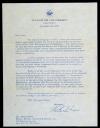

Nixon, Richard M. Typed
Letter Signed ("Dick Nixon"). One page, quarto, Washington DC, November
24, 1954. On Office of the Vice President letterhead. To Donald Rowe. Two
paperclip stains on verso show lightly on recto, mailing folds and minor age
toning. Very good condition.
Nixon campaigned actively for Republican
candidates throughout his Vice-Presidential terms. In this correspondence Nixon
thanks a campaign worker for his services: "...I want you to know how much I
appreciated all that you did to be of assistance on the television shows from
Washington and Philadelphia -- but, particularly the fine job which you and Ted
Rogers did in Denver on November 1..."
Estimated Value $500-600.
Lot 301
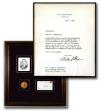

Nixon, Richard M. Typed
Letter Signed ("Richard Nixon"). As President. One sheet, octavo,
Washington, D.C., June 5, 1973. On The White House stationery. In black ink. To
one Mr. Joseph DeManuele of Kirkwood, Missouri. Accompanied by the original
transmittal envelope. Handsomely matted and framed with a black and white
printed image of the President as well as a decorative medallion depicting
Nixon for an overall size of 26½ x 27½". On horizontal fold,
otherwise in very fine condition.
During the Watergate scandal, a true
Nixon supporter appears to have sent the President the product of his artistic
talents, to which Nixon replied: "It was kind of you to send me the
pen-and-ink sketches along with your thoughtful letter...your friendship means
a great deal to me. You may be sure that throughout the years ahead I will do
everything possible to continue to merit your support."
Estimated
Value $400-500.
Lot 302
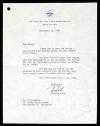

Nixon, Richard M. Typed
Letter Signed ("Dick"). As Vice President. One page, small quarto,
Washington DC, September 17, 1956. On "Office of the Vice President"
letterhead. To Caryl Warner. Transmittal fold, filing hole. Very good to fine.
A wonderfully personal letter written shortly after the death of
Nixon's father. "I want you to know how deeply I appreciated your writing as
you did with regard to my father.The past few weeks have been trying ones and
particularly so for my mother..."
Estimated Value $400-500.
Lot 303
Nixon, Richard M. Typed
Letter Signed ("RN"). As President. One page, small quarto, Washington
DC, January 12, 1973. On White House stationery. To Paul W. Williams. Mailing
fold, paperclip mark at top left. Very good to fine.
A nice thank-you
note to a New York friend: "Your kind message of birthday greetings helped to
make January 9 an especially enjoyable day..."
Estimated Value $250-300.
Lot 304
Nixon, Richard M. Typed
Letter Signed ("Richard Nixon"). As Vice-President. One page, quarto,
Washington D.C., February 20, 1959. On "Office of the Vice President"
stationery. To Mr. Edgar W. Sprague of Pennsylvania. Two horizontal folds and a
few light stains, else in very fine condition overall.
In response to a
concerned letter on the economic struggle of Communism, Nixon writes: "I agree
with you that the Soviet Union's economic offensive abroad is made possible
only by forcing upon the Russian people a low standard of living and lack of
consumer goods. This does not make their announced economic competition any the
less dangerous, however, and we must adapt ourselves to this new form of
Communist offensive." Just five months later Nixon returned to the subject
when debating with Soviet Premier Khrushchev regarding these very matters,
commenting on the quality of televisions, U.S. housing construction, and
built-in washing machines (of all things) in the impromptu "kitchen debate."
Estimated Value $200-250.
Lot 305
Nixon, Richard M. Typed
Letter Signed ("Dick"). One page, quarto, New York, November 19, 1963.
On "Twenty Broad Street" stationery. To Paul W.Williams. Transmittal fold,
fine.
After Nixon's Presidential defeat, he ran for Governor of
California and was defeated there. Taking a break from politics, Nixon moved to
New York in 1963, becoming partner in a Wall Street law firm (which promptly
put his name first on the list of partners). The thank you note penned here
comes as he was establishing himself in city: "The dinner last Thursday was one
of the most stimulating and enjoyable events I have attended since coming to
New York."
Estimated Value $200-300.
Lot 306


Polk, James K
(1795-1849) 11th President of the U.S. (1845-49). U.S. House of
Representatives (1825-39), where he was Speaker (from 1835) and a leading
Jacksonian Democrat. When the 1844 Democratic convention became deadlocked,
Polk, a "dark horse," was advanced as a compromise candidate for president and
won nomination. He narrowly defeated Henry Clay in the 1844 election. As
president, Polk proved to be his own man, even ignoring former Pres. Andrew
Jackson's wishes on several matters. His promises to achieve "four great
measures"-reduction of the tariff, reestablishment of an independent treasury,
settlement of the Oregon boundary dispute, and acquisition of California-were
kept. Despite the aggressive Democratic slogan of "Fifty-Four Forty or Fight",
Polk resolved the dispute with Britain over Oregon by adopting the 49th
parallel as the territory's northern boundary. His ordering U.S. troops to the
Rio Grande brought about the Mexican War, which resulted in U.S. acquisition
not only of California but of the entire Southwest. Few presidents have equaled
Polk's record of attaining his stated aims. Hard work undermined his health,
however, and he died a few months after leaving office.
Autograph
Letter Signed ("James K. Polk"). Three pages, quarto, Columbia,
September 11, 1834. To Colonel Samuel H. Laughlin of Nashville. Transmittal
folds with some minor separation, scattered foxing. Very good to fine.
Wonderful content from a politician on the move. As a Jackson protege,
Polk felt the heat when Jackson was roundly criticized for closing the National
Bank, and faced his own challenges as he worked to strengthen his position in
the party and be made Speaker of the House. This offering deals with many
facets of Polk's political career: "...I regret that I could not visit the
Hermitage with you before the President's departure, on more counts than one. I
desired much to have seen him. I hope you will not fail to come to our first
Rail Road Convention on Monday...you would have an opportunity of meeting the
leading men from different quarters...if it is perfectly convenient to you to
come I would like much to see you and have much political talk with you. The
time is close at hand when the state must take her stand...Others may be
uninstructed or instructed by their friends against charges with which I have
had nothing to do, but it must not, shall not be at my expense..." The Rail
Road meeting mentioned above is a political assembly and Polk was obviously
instrumental in coordinating the first one in Tennessee. Several sources
mention Laughlin's political relationship with Polk and, following Polk to
Washington after his election, Laughlin was appointed Recorder of the General
Land Office.
Estimated Value $2,500-3,500.
Dinner with the Stars
Lot 307


Reagan, Ronald (1911- )
40th President of the U.S. (1981-89). A film actor who was president of the
Screen Actors Guild, he was a supporter of the New Deal long before he joined
the Republican party in 1962 and began to champion right-wing causes. As
governor of California for two terms (1967-75), he cut state welfare and
medical services and education funds. After leaving office, he campaigned for
the 1976 Republican presidential nomination but lost narrowly to Pres. Gerald
Ford. Four years later he won the nomination and, with his running mate, George
Bush, resoundingly defeated Pres. Jimmy Carter. His presidency had barely begun
when he was shot by a would-be assassin, John Hinckley, Jr., on Mar. 30, 1981;
he recovered quickly. He was reelected in 1984, defeating Democratic candidate
Walter Mondale. Reagan adopted a firm stance in relations with the USSR and
against possible Communist expansion, especially in Central America.
Nonetheless, he made important steps in U.S./Soviet nuclear disarmament
negotiations, signing the INF treaty with the USSR. His tax and spending
policies, however, led to enormous peacetime budget deficits, greatly
increasing the national debt. In 1994 he disclosed that he had Alzheimer's
disease in hope of increasing public awareness of the illness.
Lot of
two. The first item is a "Masquers Honor Ronald Reagan" program, dated October
9, 1959, signed by Ronald Reagan, Edward G. Robinson, Spring Byington, Jack
Benny and June Allyson. Everyone has signed on one side of the
opened quarto program. There is significant soil, presumably from the dinner
itself, but the signatures are nice and strong. Our second item in this lot is
another Masquers program, this time honoring Steve Allen. Dated December 4,
1959, this program features the signatures of Allen, Jayne Meadows, Kirk
Douglas, Louella Parsons Less soil than above, good
condition.
Reagan was a movie star long before he was a politician and
here we have a great link to that part of his life and his contemporaries!
Estimated Value $350-400.
Lot 308
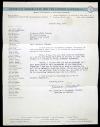

Roosevelt, Eleanor
(1884-1962) Wife of Franklin D. Roosevelt, the 32nd President of the U.S.
Eleanor was called the "First Lady of the World" by Harry Truman for her
humanitarian efforts on behalf of the world's children and poor. An influential
figure in her husband's administration, she helped found UNICEF and worked
diligently on civil rights issues.
Typed Letter Signed ("Eleanor
Roosevelt"). One page, quarto, New York, October 18, 1960. On American
Association for the United Nations letterhead. To Alvin Bahnsen. Mailing folds,
some toning, two minor spots near date and address. Good to very good
condition.
Eleanor Roosevelt was deeply committed to the work of the
United Nations and spent most of her later years dedicated to the organization.
This offering finds Mrs. Roosevelt taking care of the details of organizing the
Second Biennial Convention of the Association.
Estimated Value $200-250.
Lot 309


Roosevelt, Franklin D
(1882-1945) 32d president of the U.S. (1933-45). A lifelong politician,
Roosevelt campaigned for Woodrow Wilson in the 1912 election, served as
assistant secretary of the navy (1913-20) and ran as vice presidential
candidate with James Cox on the losing Democratic ticket in 1920. Stricken with
poliomyelitis in 1921, he eventually regained partial use of his legs. Elected
governor of New York in 1928 and reelected in 1930, Roosevelt learned to deal
with the problems of the Great Depression. After defeating Hoover in the 1932
presidential election, he assured a United States racked with economic crisis
that "the only thing we have to fear is fear itself." He acted quickly during
the so-called Hundred Days (Mar.-Jan. 1933) to rush through Congress a flood of
fiscal and social reform measures aimed at reviving the economy by a vast
expenditure of public funds. Roosevelt was the first president to broadcast
over the radio; his "fireside chats" explained issues and policies to the
people and he easily won reelection in 1936. With the outbreak (1939) of World
War II, Roosevelt extended aid to Britain and began Lend Lease, while building
up U.S. armed forces by the first peacetime Selective Service (1940). He broke
precedent by seeking and winning (1940) a third presidential term and, later
(1944), a fourth. After the Japanese attack on Pearl Harbor, Roosevelt, as
commander in chief, directed the nation's immense war effort, held conferences
with Winston Churchill and other Allied leaders, and worked to establish the
UN. On April 12, 1945, he died suddenly from a cerebral hemorrhage.
Document Signed ("Franklin D. Roosevelt"). As President.
Partially printed, accomplished in manuscript. One page (mounted on
paperboard), 23 x 19", Washington DC, August 8, 1944. Countersigned by Edward
Stettinius, Jr., as Acting Secretary of State. Being an appointment to the
Tariff Commission. Paper has toned somewhat, minor foxing and discoloration at
bottom left corner affects seal to a minor degree, possible water damage to
very edge at bottom at right corner, ink bleed which does not affect
signatures. Good to very good condition.
An excellent piece of
bureaucratic history, this wartime appointment of George Z. Barnes of Illinois
is a marker in Roosevelt's management of the economy in the face of war
pressures and his plans for the inevitable upheavals of the coming peace.
Roosevelt always kept the post-War economic health of the nation in mind, as
evidenced by his statement late in 1943, "...it seems pretty clear that we must
plan for, and help bring about, an expanded economy which will result in more
security, more employment, more recreation, for our citizens so that the
conditions of 1932 and the beginning of 1933 won't come back."
Estimated
Value $700-800.
Lot 310
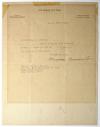

Roosevelt, Theodore
(1858-1919) 26th President of the U.S. (1901-1909). Bereaved by the deaths
(1884) of his mother and his wife, Alice Hathaway Lee, he retired to his ranch
in the Dakota Territory. He was elected vice president under William McKinley,
and upon McKinley's assassination in Sept. 1901 became president at the age of
42. An activist and an innovative leader, he set about "trust busting" by
initiating some 40 lawsuits against the big trusts. He also fathered important
conservation legislation. His championship of the rights of the "little man"
captured the people's imagination, and he was reelected (1904) by a landslide.
His second administration secured passage of the Pure Food and Drug Act of
1906. His progressive reforms aimed at regulation, not abolition, of big
business. Roosevelt decisively increased the power of the president,
particularly in foreign affairs. Claiming that the U.S. had the right to impose
order in Latin America, he intervened (1903) in a civil war in Panama to foster
construction of the Panama Canal. He mediated (1904) the end of the
Russo-Japanese War for which he won the 1906 Nobel Peace Prize. Although he had
hand-picked William Howard Taft to succeed him, he became angry at Taft's
apparent lack of progressive principles and split the Republican party in 1912,
running for president as the third-party Progressive (or Bull Moose) candidate.
He outpolled Taft but lost the election. During his busy career he found time
for big game hunting and for writing many books.
Typed Letter Signed
("Theodore Roosevelt"). One page, quarto, New York, August 15, 1918. On
Kansas City Star letterhead. To Captain Basil M. Stevens. Toning, mat burns,
adhesive residue at top and upper left edges, a spot at upper right edge,
mailing folds. Good condition.
"That's a mighty nice letter of
yours....I do hope you can soon get to the front," probably responding to a
note of sympathy, Roosevelt writes these words just one month after the death
of his son Quentin in battle. Roosevelt had gladly sent his sons and daughter
to serve during World War I and he never wavered in his support of the Allies'
cause, but many believed Roosevelt never recovered from his son's death (he
died only six months later).The day after learning of Quentin's demise,
Roosevelt spoke before an audience, never mentioning his son's death but deeply
marked by it: "The finest, the bravest, the best of our young men have sprung
eagerly forward to face death for the sake of a high ideal..." he said. " When
these gallant boys, on the golden crest of life, gladly face death...shall we
who stay behind, who have not been found worthy of the great adventure...try to
shape our lives so as to make this country a better place to live in."
Estimated Value $300-400.
Lot 311


Roosevelt, Theodore.
Signature ("Theodore Roosevelt"). As President. One page, 10 x 7",
n.p. (Washington?), n.d. Clipped signature in black ink on the bottom of a
military appointment. One horizontal and two vertical creases, neither affects
the signature, penciled notation at bottom of page, the ink at the end of the
signature has minor flaking, the signature remains strong. Very good condition.
Estimated Value $250-300.
Lot 312
Roosevelt, Theodore.
Signature ("Theodore Roosevelt"). One page, 4¼ x 2¾",
Washington, n.d. On "The White House / Washington" card. Minor toning, damp has
caused minor ink bleed at "lt", otherwise very good to fine.
Estimated Value $250-350.
Lot 313
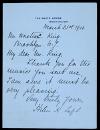

Taft, Helen (1861-1943)
Ambitious and intelligent, Helen Taft was largely responsible for her husband's
political success and, in spite of a stroke in 1912, remained a prominent
figure in Republican politics for most of her life.
Autograph Note
Signed ("Helen H. Taft"). One page, octavo, Washington DC, March 21,
1910. On light blue White House stationery. To Mr. Horatio King. Transmittal
fold, adhesive residue on verso, surface soil at bottom. Very good to fine
condition.
A gracious thank-you note from a warm, witty, very charming
First Lady; "Thank you for the music you sent me, I am sure it must be very
pleasing."
Estimated Value $300-400.
Lot 314
Taft, Helen. Signature
("Helen H. Taft"). One page, 4½ x 2½", n.p., 1927. Black
ink on cream card stock. Includes original transmittal envelope. Some toning,
one corner abrasion at upper right, very good to fine.
Estimated Value
$75-100.
Lot 315


Taft, William H
(1857-1930) 27th President of the U.S. (1909-13) and 10th Chief Justice of
the U.S. Supreme Court (1921-30). Secretary of War (1904-8) and a close adviser
to President Theodore Roosevelt, he ran as Roosevelt's successor in 1908 and
defeated William Jennings Bryan. Taft continued many of Roosevelt's policies,
but his steadfast conservatism antagonized the progressive elements in his
party. Taft's relations with Roosevelt deteriorated and in 1912 he ran for
reelection against his former mentor. The Republican vote split and Democrat
Woodrow Wilson was elected. Appointed Chief Justice by President Harding
(1921), Taft's main contribution to the Court was in his administrative
efficiency.
Autograph Letter Signed ("Wm H Taft"). As Secretary
of War. One pages, recto and verso, small octavo, Washington DC, n.d. To
"Mr. Gibson." On War Department note card. Mounted into paper frame, but
both sides are visible. Toning, minor surface soil. Fine.
Important
content about insurrections in the Philippines: "The only insurrecto
districts are Batangas, Laguna, the northern part of Tayatas and Samar. There
are Cadrone bands in the interior of the Negros but not insurrectos...in
Northern Luzon are neither insurrecto nor are they disturbed in any way. The
map is inaccurate in not including part of the Tayabas as disturbed... and in
showing the Negros to be insurrecto." The United States took control of the
Philippines after the Spanish American War and had to deal with the
independence fighters under Emilio Aguinaldo for many years, even after
Aguinaldo was captured. Taft was appointed Governor General of the Philippines
in 1902 and continued to govern the islands even after he moved to Washington
to serve as Secretary of War.
Estimated Value $1,200-1,500.
Lot 316
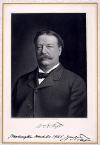

Taft, William H.
Engraving Signed ("Wm H Taft"). As Chief Justice of the United
States. Waist-length portrait, 7 x 11", "Washington March 24 1925".
Matted to 12 x 16". Very fine.
This beautiful portrait by Charles B.
Hall of New York has an almost photographic feel which enhances strength of
Taft's features. The quality of the image and the inscription make this a
wonderful piece for display.
Estimated Value $450-550.
Lot 317
Taft, William H.
Signature ("Wm H Taft"). One page, 4¼ x 2¾", Washington,
n.d. On "The White House / Washington" card. Fine.
Estimated Value
$150-250.
Lot 318
Taft, William H. Lot of
two. Signature ("Wm H. Taft"). As Chief Justice of the Supreme Court.
One page, 2½ x 4½, Washington DC, November 28, 1927. Black ink on
cream card stock.Includes original transmittal envelope. Inscribed "With
pleasure for Miss Ida G. Corey Seattle Washington". Minor toning, faint
abrasions to bottom corners. Very good condition.
Estimated Value $125-150.
Lot 319
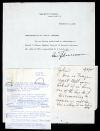

Truman, Harry S
(1884-1972) 33rd President of the U.S. After a decade in local Democratic
politics, he was elected U.S. senator in 1934 and reelected in 1940. During
World War II, he achieved national prominence as chairman of a committee
investigating government spending. He was nominated for vice president in 1944
and elected along with Pres. Franklin D. Roosevelt. Roosevelt's death on Apr.
12, 1945, thrust Truman into the presidency at a crucial time-the closing days
of World War II. After the war in Europe ended on May 8, Truman authorized the
use of the Atomic Bomb against Japan at Hiroshima (Aug. 6) and Nagasaki (Aug.
9). On Aug. 14, Japan surrendered. Truman's domestic program, essentially a
continuation of Roosevelt's New Deal, was frustrated by the resurgence of the
Republicans, who won control of Congress in 1946. In foreign affairs,
increasing tensions with the USSR resulted in the Cold War. Truman took
increasingly tough stands. The Truman Doctrine (1947) was aimed at protecting
Greece and Turkey from Communist domination. The Marshall Plan (1947) was
designed to effect the economic recovery of Western Europe. The North Atlantic
Treaty Organization (1949) was a multinational defense plan. In the 1948
presidential election Truman won a stunning (and unexpected) victory over
Thomas E. Dewey. Foreign affairs also dominated his second term, particularly
American involvement in the Korean War. Truman chose not to run for reelection
in 1952 and retired to Independence. His term of office was marked by
controversy from beginning to end. Among his controversial acts were his
decision to use the atomic bomb, the "loss" of China to the Communists, and his
firing of Gen. Douglas MacArthur during the Korean War. He was much respected
for his plain speaking and for his ability to make hard decisions, however, and
during the 1970s public opinion polls consistently showed him to be among the
most admired of American presidents.
Archive of seven items from the
papers of John Steelman (Truman's assistant). Archive includes an Autograph
Letter Signed (as President), a Document Signed (as President), a corrected
typescript draft of a Presidential Statement regarding the Army Reserves, a
note concerning the visit of Gov. Sherman Adams to the White House, and a draft
of the decree creating an "Organized Reserve" force. Conditions vary, there is
some paperclip staining to the draft and some surface soil to the other pieces.
Overall, good to very good condition.
Truman's ALS to Steelman: "Here
is Sawyers report. Will you look at it or have one of the boys do it. He's
coming tomorrow or next day. I'm reading it as I can. HST" The signed
document reads: "Memorandum for Dr. John R. Steelman You are hereby authorized
to administer to Robert C. Turner, Member, Council of Economic Advisers, the
oath of office prescribed by 5 U.S.C. 16." The corrected typescript is a
statement by the President with corrections done in ink and pencil by the
President and red pencil by Mr. Steelman and outlines concerns about the Army
Reserves.
Estimated Value $3,000-4,000.
Lot 320


Truman, Harry S. Signed
Photograph ("Harry S. Truman"). Color, 9¼ x 7¼", Key West,
December 6, 1949. Mounted on photographer's board to 12½ x 10½".
Signed on board, directly under photograph. Also signed by Bess and Margaret
Truman, as well eight other family members. Some scattered deterioration in
photograph and one area of faint discoloration at top corner, otherwise very
good to fine.
Estimated Value $1,250-1,500.
Lot 321
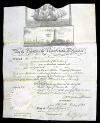

Van Buren, Martin
(1782-1862) 8th President of the U.S. (1837-41). He served (1821-28) in the
U.S. Senate. Elected governor of New York in 1828, he became one of Andrew
Jackson's supporters and resigned to become Jackson's secretary of state
(1829-31). He was Jackson's running mate in the 1832 presidential election and
was elected vice president. Largely through Jackson's influence, he was the
Democratic candidate for president in 1836 and won. He intended to continue
Jackson's policies, but the Panic of 1837 and the hard times that followed made
him very unpopular. He was defeated for reelection in 1840 by William Henry
Harrison, the Whig Party candidate. He remained a power in Democratic politics,
but in 1848 ran for president as the candidate of the Free-Soil Party and
managed to throw the election to Zachary Taylor. He supported Abraham Lincoln
in the secessionist crisis.
Document Signed ("MvanBuren"). As
President. One page, small folio, Washington DC, August 24, 1839. Countersigned
by John Forsyth as Secretary of State. Being a scalloped edge ship's paper for
the Barque Draco of Fairhaven. Foxing throughout does not detract from the
appeal of the piece, two horizontal and one vertical fold. Very good condition.
Estimated Value $1,500-2,000.
Lot 322
Wilson, Woodrow
(1856-1924) 28th President of the U.S. (1913-21); born Staunton, Va. He was
educated in law at Princeton Univ., the Univ. of Virginia, and Johns Hopkins
Univ. (Ph.D., 1886). A noted scholar, he taught at Bryn Mawr College and
Wesleyan Univ. before becoming (1890) professor of jurisprudence and political
economy at Princeton. In 1902 he became president of Princeton. In 1910 he was
elected governor of New Jersey on a reform Democratic ticket. As governor
(1911-13) he accomplished various important reforms. At the 1912 Democratic
convention he was nominated for president on the 46th ballot, largely through
the efforts of W.J. Bryan and E.M. House. He was elected president when the
Republican vote was split between W.H. Taft and Theodore Roosevelt. Wilson's
domestic program, known as the "New Freedom," was generally progressive; among
its accomplishments were the Federal Reserve System (1913), the Federal Trade
Commission (1914), and the Clayton Antitrust Act (1914). In foreign affairs,
the early difficulties with Mexico were soon overshadowed by the outbreak of
World War I in Europe. Wilson's early efforts to maintain U.S. neutrality were
shaken by the sinking (1915) of the Lusitania and other German aggressions.
Nevertheless, he ran for reelection in 1916 on the boast of having "kept us out
of war," and narrowly defeated Charles Evans Hughes, the Republican candidate.
Relations with Germany continued to deteriorate and war was declared on Apr. 6,
1917. Wilson viewed the war as necessary to make the world "safe for democracy"
and quickly put the nation on a war footing. Looking forward to peace, he
enunciated his plans for its implementation with his Fourteen Points. When the
war ended, he sailed (Dec., 1918) for Europe to take part in the peace talks.
Wilson's idealism was widely admired in Europe, and he was looked upon as the
best hope for a just peace. Despite his disappointment with the eventual
treaty, he pinned his great hopes on the League of Nations. At home, however,
isolationism had reasserted itself, particularly among the Republicans in
Congress. Wilson's last efforts as president were spent in a futile attempt to
win U.S. ratification of (and thus membership in) the League. Exhausted from
his labors, he suffered a stroke in Sept. 1919 and never fully recovered. He
was awarded the 1919 Nobel Peace Prize.
Typed Letter Signed
("Woodrow Wilson"). As President. One page, small quarto, Washington DC,
May 4, 1917. On White House letterhead. To Roger Scaife of Houghton Mifflin.
Mailing fold, dampstaining along bottom edge, noticeable toning throughout.
Good to very good condition.
Taking care of the details of publishing
Wilson's addresses.
Estimated Value $250-350.
Lot 323
Wilson, Edith Bolling.
Signature ("Edith Bolling Wilson"). One page, 3½ x
2½", n.p., 1927. Black ink on white card stock. Includes transmittal
envelope with stamped Free Frank and a letter from Mrs. Wilson's secretary.
Minor adhesive residue on verso, otherwise fine.
Estimated Value $45-UP.
Go to Next Session















